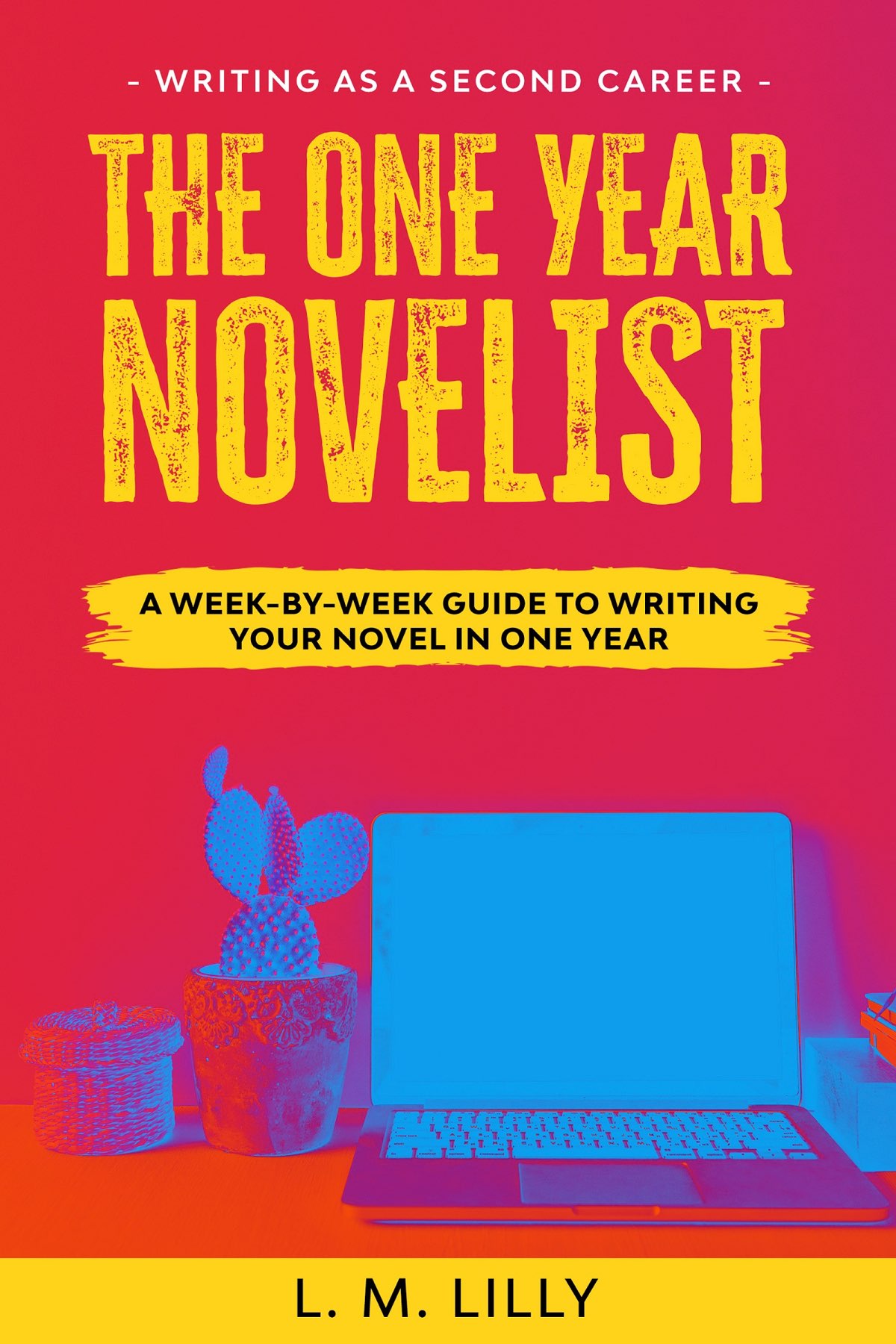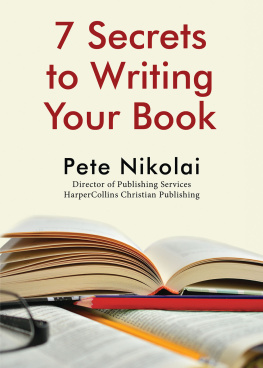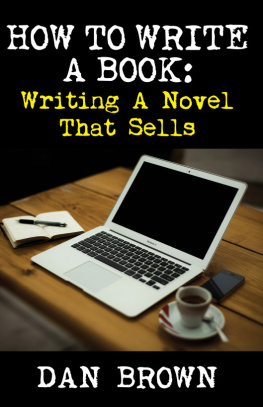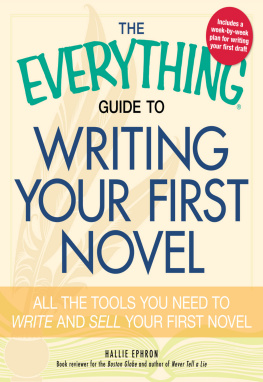
The One-Year Novelist
A Week-By-Week Guide To Writing Your Novel In One Year
L. M. Lilly
Contents
Introduction
If youre like me, and like most writers, you cant devote every waking hour to writing a novel. You need to fit it in along with other responsibilities.
You might be raising children, working another full-time (or more than full-time) job, pursuing a degree, or all of the above.
Because of that, writing and finishing a novel can feel overwhelming. And when you hear about those authors who publish a book a monthforget it.
The good news is that you can start with an idea and finish a solid draftone youre comfortable sharing with an editor or beta readers within one year by following the week-by-week plan in this book.
This plan works whether youre able to follow the age-old advice of writing the same time every week or day or whether your schedule varies widely from week to week and month to month.
Its designed to work around a full-time or more than full-time career or job, a family, and/or other demands on your time.
In fact, the weekly breakdown assumes you dont have endless hoursor perhaps a single hour at any one timeto hide away and do nothing but write.
For the same reason, the weekly breakdown allows for times when you might speed ahead and others when you need to set your novel aside for a while. You can also feel free to shift tasks to different days that work better for you during a given week.
Getting Started
You can start your one year, and your novel, any time.
The weeks are numbered. Whether you begin January 1, November 1, or April 15 (but maybe dont start then if youre in the United States, as tax time is already stressful enough), its Week 1.
Follow the steps and youll finish in Week 52.
What This Book Includes (And Doesnt)
The week-by-week plan briefly covers plot turns and character development because knowing your storys major turns and your main characters ahead of time eliminates figuring everything out on the fly, which slows the writing process. An overview of point of view and viewpoint characters is included as well.
These topics arent discussed in depth, though, because delving into each would make The One-Year Novelist more of a writing guide and less of a one-year plan.
Many weeks in the following pages also include ways to strengthen your commitment to finishing your novel in a year.
Thats important because without commitment, when theres an open twenty minutes in your schedule youre more apt to think something like:
- Twenty minutes isnt enough to get anything written
- Itll take me that long to find my place again and get rolling
- The kids really want a ride to their friends house
- I havent cleaned the kitchen in a week
Some of these are real issues. At some point you need to clean the kitchen, and your children (or other family members and friends) do need you.
But we were talking about twenty minutes that werent spoken for yet, so these questions are about wanting to write a novel, but not being committed enough yet to doing it. If youre committed, youll seize those twenty minutes to write.
Happily, youve already made a commitment by reading this book, and the weekly breakdown includes steps to help you stick with it.
What If Youre Not A Planner (Or Youve Already Outlined Your Novel)
If youre not a planner, dont worry, the week-by-week process doesnt require a detailed outline that will keep you from exploring as you write.
If youd like to skip the planning phase, though, either because you prefer to do all your exploring as you write or youve already outlined or sketched out your novel, you can use The One-Year Novelist with a few changes.
Read through the planning weeks in one shot. (Itll be quick, as thats only 11 pages with lots of white space.)
Do the commitment exercises in Weeks 1, 3, and 6. This will take 15-30 minutes tops.
Start with Week 12 and keep pace with the word count goals.
When you hit a week that refers to a plot turn covered in Weeks 1-8, you can do one of two things:
(1) Reread that week and see if or how it applies to your writing. If you need to, take an extra week to work through that. (Youve got 11 weeks to spare!)
(2) Write straight through without pausing or being concerned about your plot turns, staying within the word count goals for each week. At the end, you can use the extra 11 weeks to adjust your plot if you find you need it.
Either way, youll have a solid first draft at the end of the year.
My Story
Because Im sharing a one-year plan for writing novels, you may want to know what Ive written.
At every stage of my adult life Ive written and finished novels. I finished my first one (not published) while working at my first full-time job. That job was basically 9-5, making it pretty easy to keep to the same writing schedule every week.
I wrote other novels while temping, so Id work a few weeks when I really needed money, then take time off to write.
Of the 4 books in my Awakening supernatural thriller series, all but the last one (The Illumination) were written when I was practicing law anywhere from 40-65 hours a week, and I almost never worked the same hours from week to week. Each novel took less time to write as I adjusted my schedule and made better use of my time.
There were months, though, that I wrote no fiction at all and others when I left my office every day around 6 p.m. and was able to fit in 2-3 hours of fiction writing a week.
Now, although I spend fewer hours at law, I still juggle multiple responsibilities, including teaching legal writing, running the website WritingAsASecondCareer.com, hosting the podcast Buffy and the Art of Story (a podcast for writers who love Buffy the Vampire Slayer) and writing non-fiction. All of which means my schedule still varies widely from week to week and month to month.
In short, the advice to write the same time every day or week has almost never been feasible for me. I suspect its not for many people, which is another reason I wrote The One-Year Novelist.
My first published novel, The Awakening, has been downloaded over 70,000 times and reached No. 1 in numerous categories for free and paid books on Amazon, including Occult, Horror, Feminist, and Paranormal. The second book in my Q.C. Davis mystery series, The Charming Man, was recently named a finalist in the 2019 Wishing Shelf Book Awards.
I hope this history shows that despite other demands on your time, you can still write and finish your novel.
Tracking Your Progress
If youre like me and want to write or type notes on whatever you figure out about your novel and track your word count, you can write in the workbook edition of this book or use this free downloadable template.
Spoilers
Throughout this book, I use examples from Pride and Prejudice by Jane Austen. I chose it because many people are familiar with the story in the form of the book, film(s), and the mini-series.
If you havent read or seen it, I include enough context for you to understand the examples. But be warnedI give away major plot turns, though not the ending. So nows the time to watch it or read it if you dont want anything spoiled.
Okay, are you ready to startand finishyour novel?
Next page







